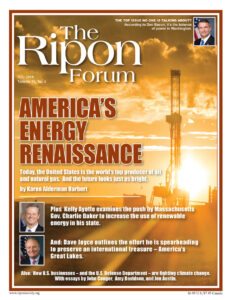WASHINGTON, DC — Energy independence.
Twenty years ago, the notion that the United States could somehow wean itself off of imported fuel to power its economy seemed like a pipe dream.
After all, the country at the time was importing more than half of the oil and gas it consumed each day from other countries – more than 10 million barrels of crude oil daily in April of 1998 alone. But two decades later, all of that has changed.
This past April, the U.S. imported just over 2.6 million barrels of oil and gas per day, and the International Energy Agency recently reported that the U.S. will be the leading producer of oil in the world by 2023.
This turnaround didn’t just happen by chance. As Karen Alderman Harbert of the U.S. Chamber of Commerce’s Global Energy Institute writes in the cover story for the latest edition of The Ripon Forum, advances in hydraulic fracturing and other technologies made oil and natural gas that were previously trapped in shale formations accessible and cost efficient to produce.
Equally if not more significant were U.S. property laws, which gave landowners the rights to the minerals beneath the ground. As a result, most of the discoveries occurred on private, not federal, property – a fact, Harbert says, that helped fuel the advances we’ve seen in recent years. “Indeed,” she writes, “given the hostility of the previous administration to hydrocarbon fuels, it’s quite likely that we would not be talking about the shale revolution at all had these resources been confined to federal lands … Make no mistake: the energy renaissance took hold in spite of federal policy, not because of it.”
A revolution is also taking placing in the area of clean energy. According to former Senator Kelly Ayotte, it is being led by Governors such as Charlie Baker of Massachusetts. “Since taking office in 2014,” Ayotte writes, “the Baker-Polito Administration has pursued fiscally responsible policies to mitigate and adapt to climate change by expanding the state’s renewable energy industry and regional collaboration in reducing the production of greenhouse gas. Governor Baker has been able to do this while also increasing aid to local cities and towns, cutting taxes and creating more than 150,000 new jobs.” The result, Ayotte adds, is not only a state that is at the forefront of the clean energy revolution, but a Governor whose 71% approval rating is the highest in the nation.
In addition to examining the energy revolution underway in America, this latest edition of the Forum also looks at the effort to protect the environment. One of these efforts is being spearheaded by U.S. Rep. Dave Joyce of Ohio. Joyce is the author of the Great Lakes Restoration Initiative, a plan aimed at preserving a resource that Joyce says is important for both the American people and people around the globe. “The Lakes account for more than 20 percent of the world’s fresh surface water supply, and they provide drinking water for more than 40 million people,” the Ohio Republican writes. “Protecting and restoring the Great Lakes is not only in the best interest of our nation, but of the international community.”
This edition also examines what both the U.S. Department of Defense and U.S. businesses are doing to fight climate change, with essays by three thought leaders on the issue – John Conger, who serves as Director of the Center for Climate and Security; Amy Davidsen, who serves as Executive Director of the Climate Group; and Jen Austin, who serves as Policy Director at the We Mean Business coalition.
In another essay, former White House speechwriter Curt Smith looks at former President George H.W. Bush’s passion for baseball. And Jonathan Bydlak of the Coalition to Reduce Spending shares his thoughts on the exploding national debt – the fourth op-ed the Forum has featured on this subject this year.
In our latest debate feature, Texas Railroad Commissioner Wayne Christian and Colorado State Professor Scott Denning square off over climate science. And in our latest Ripon Profile, Nebraska Congressman Don Bacon discusses the challenge facing his District that he working to address and the agency within the federal government he believes is in dire need of reform.
The Ripon Forum is published six times a year by The Ripon Society, a public policy organization that was founded in 1962 and takes its name from the town where the Republican Party was born in 1854 – Ripon, Wisconsin. One of the main goals of The Ripon Society is to promote the ideas and principles that have made America great and contributed to the GOP’s success. These ideas include keeping our nation secure, keeping taxes low and having a federal government that is smaller, smarter and more accountable to the people.




